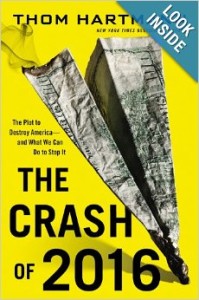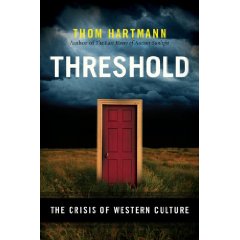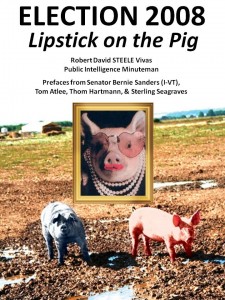 Heart-Felt, Intelligent, Useful but Still Believes in Democratic Party, October 26, 2008
Heart-Felt, Intelligent, Useful but Still Believes in Democratic Party, October 26, 2008
Thom Hartmann
I bought this book after receiving the author's words from Tom Atlee that then became part of the prefaces for Election 2008: Lipstick on the Pig (Substance of Governance; Legitimate Grievances; Candidates on the Issues; Balanced Budget 101; Call to Arms: Fund We Not Them; Annotated Bibliography). I then realized that this same author gave us Screwed: The Undeclared War Against the Middle Class – And What We Can Do about It (BK Currents (Paperback)).
The author, a self-described liberal, accomplishes roughly three things in this book:
1) Introduces neuro-linguistic programming and framing concepts as a means of understanding the political theater that passes for democracy today;
2) Seeks to differentiate the conservative “code” versus the liberal “code” and criticizes both–the conservative code for being false and unsustainable, the liberal code for failing to make the leap that connects and empowers We the People.
3) Goes on to discuss how to combine “code-aware” story-telling with the reassertion, recreation, and promulgation of the new liberal “brand.”
I admire this book and recommend it highly. I could not give it the full five stars for two reasons: first, the author blindly accepts the Democratic Party as “good,” not recognizing that they are actually “crime lite” in contrast to the Republican Party (and also the new face of Wall Street, with the Republicans designated to take the fall this time around in what has been a “fixed” and fraudulent electoral system since the 2000 fraud made pre-selection a given option); and second; he actually thinks Nancy Pelosi knows what she is doing–I think she is a doormat with no spine, so right off we have some cognitive dissonance. This case has been made by Peter Peterson in Running on Empty: How the Democratic and Republican Parties Are Bankrupting Our Future and What Americans Can Do About It so I will not belabor it. BOTH parties are evil and BOTH parties have betrayed the public trust.
Where the author really connected with me was toward the end, when he spoke about resurrecting “We the People” and the “brand” of all that is good about liberalism. If I set aside my disdain for both parties, what the author has to offer is a “code” for the new Transpartisan Alliance and organizations like Reuniting America and the World Index of Social and Environmental Responsibility. Please do look them up.
The book seeks to help good people communicate good ideas.
Here are highlights from my reading, all good:
+ Politics is a set of stories intended to arouse specific responses.
+ The liberal story is about interconnected world with inherently good people who need safety nets and community; the conservative story, as portrayed by the author, is about people being evil, fate being deterministic, and gated communities being the solution.
+ The author provides a truly impressive and subtle primer on neuro-linguistic programming, framing, and most impressive, how to help people transform “victim” stories into “learning” stories.
+ He places great stress on not seeking to stop or end or criticize bad status quo behaviors and policies, but instead trying to find fundamental connections (we all want American the Beautiful) and then seeking consensus on new positive ideas.
+ The author provides a very concise summary of Hobbes' Leviathan (war is a natural state) versus Locke's two treatises (and no mention of the social contract that I noticed), which points out that accumulated wealth is unnatural and impairs the broader community. I really enjoyed this.
+ He discusses the Jeffersonian draught of instruction on how a colony might secede, and I myself, speaking at the secessionists' conference in mid-November, make a note to look it up–if we cannot dismantle the two criminal parties, then secession is the only “legal” option for Vermont, the South, the Pacific Northwest, and so on.
+ The author draws a number of contrasts with story-telling examples, of “conservative” versus “liberal” framing:
– SECURITY: gated community versus all happy
– MORALITY: about what people do in private versus public welfare
– MONEY: “death tax” versus “rich kid tax”
– IRAQ: “just war” versus “unjust occupation”
The author resonates with me when he uses Franklin D. Roosevelt (FDR) and John F. Kennedy (JFK) as the examples of the liberal brand done right.
He points to an example of government doing the right thing in Germany: they ordered the banks to give very low cost loans to home-owners for buying solar power systems; and they ordered the power companies to buy the excess power at seven times the going rate. The outcome: they got 100,000 solar-powered homes GIVING BACK the equivalent of one new nuclear power plant (and the power company saved that investment).
In passing he slams Reagan for ending the non-profit status of health care, and Gingrich for teaching the Republicans how to code their way to victory.
The book ends with “democracy begins with you…you're it.”
Books that I am reminded of and recommend along with this one:
The Tao of Democracy: Using Co-Intelligence to Create a World That Works for All
The Springboard: How Storytelling Ignites Action in Knowledge-Era Organizations (KMCI Press)
The World Cafe: Shaping Our Futures Through Conversations That Matter
Imagine: What America Could be in the 21st century
The Cultural Creatives: How 50 Million People Are Changing the World
Society's Breakthrough!: Releasing Essential Wisdom and Virtue in All the People
Collective Intelligence: Creating a Prosperous World at Peace
I believe this book, as with the other books mentioned above, matters. However, I believe it is very important for all to reflect on the FACT that neither of the two candidates has addresses the substance of governance; neither has published a draft balanced budget; and regardless of who wins–with the fraud on both sides evening out–We the People all lose.
To end as the author suggests, with a personal story: I am an estranged moderate Republican, leaning toward Libertarian, who also respects all that the Green Party stands for, while yearning for every citizen to be an Independent. We the People are no more–for now. Corruption reigns in America–we are a “Cheating Culture” through and through.

![]() Provocative and Troubling Look at an Impending Economic Implosion, November 16, 2013
Provocative and Troubling Look at an Impending Economic Implosion, November 16, 2013







